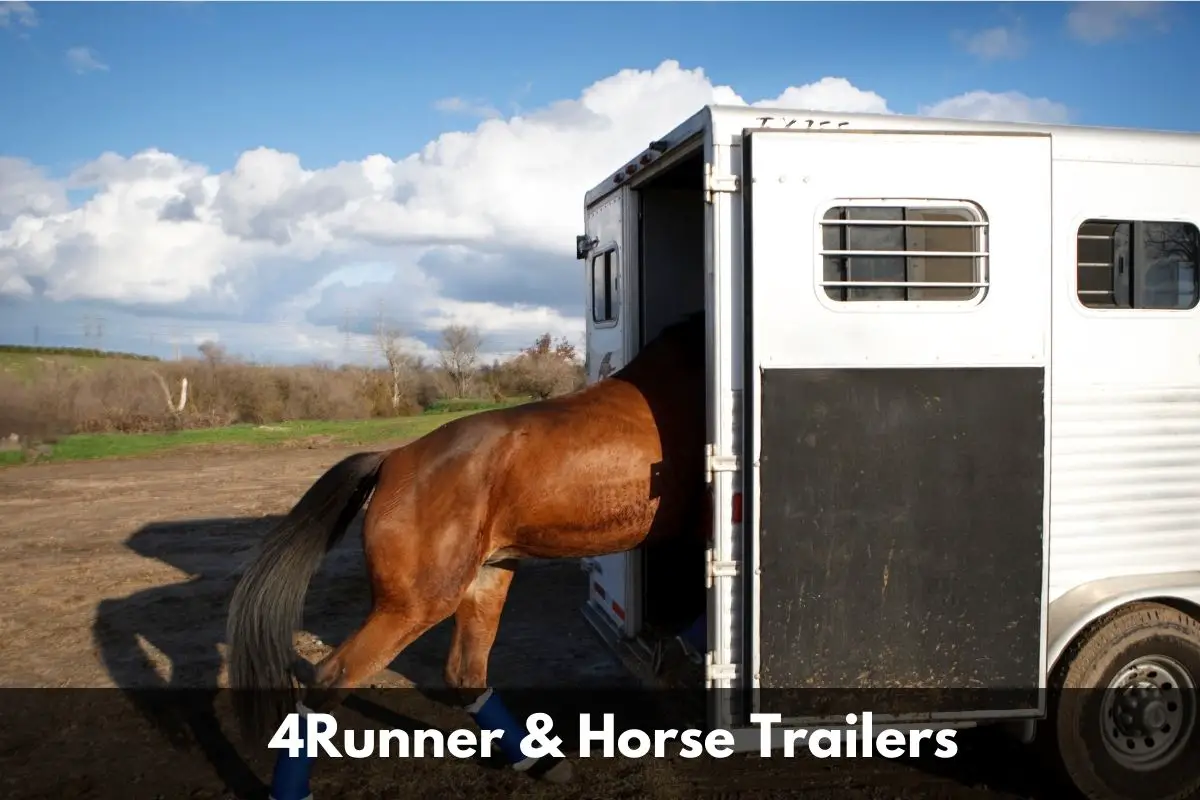A 5th-wheel trailer is a recreational vehicle usually towed by a pickup truck; the 5th-wheel trailer generally requires the truck bed to have a 5th-wheel capable hitch in the bed. Since Toyota 4Runners do not have a bed, they cannot tow a 5th-wheel trailer.
Some larger 3/4 ton SUVs can tow a 5th-wheel trailer, even though they do not have the standard truck bed required. A product called an automatic safety hitch makes this possible. Unfortunately, there are additional reasons a 4Runner cannot tow a 5th-wheel trailer.
As we said, the lack of a bed for proper hitch placement isn’t the only reason a 4Runner cannot tow a 5th-wheel trailer.
Some additional reasons include the following:
– 4Runners have a lower towing capacity than many pickup trucks.
– The shorter wheelbase of a 4Runner can make towing a 5th-wheel trailer more difficult.
– The rear suspension of the 4Runner is not well suited for towing heavy loads.
Low Towing Capacity
5th Generation Toyota 4Runners have a maximum towing capacity of 5,000 pounds (2,268 kg). This is less than half of what many 1/2-ton and 3/4-ton pickup trucks can tow. The average 5th-wheel trailer weighs 12,700 pounds, over double the maximum tow capacity of the 4Runner.
If you go over your vehicle’s towing capacity, you could damage your vehicle and void your warranty. So, knowing your vehicle’s towing capacity is essential before you try to tow anything.
If you are over your vehicle’s capacity and happen to have an accident, your insurance could refuse to cover the damages.
You can’t increase towing capacity where it will reliably pull more than the factor tow rating.
Shorter Wheelbase
4Runners have a shorter wheelbase than most pickup trucks. The 5th generation 4Runner has a 109.8-inch (2,780 mm) wheelbase. This is nearly 20 inches (508 mm) shorter than the average 1/2-ton truck and nearly 30 inches shorter than the wheelbase of larger 3/4-ton trucks. A shorter wheelbase can create issues when towing a 5th-wheel trailer.
Some of the issues a shorter wheelbase can create are:
– The 4Runner is more likely to sway when towing.
– Making turns with a 4Runner and a trailer can be more difficult.
– A shorter wheelbase can put more strain when towing in adverse conditions like wind.
Lighter Duty Suspension Components
A lighter-duty suspension can be an issue for towing; in the short term, a lighter suspension might not have any issues towing. However, the suspension components could wear out over time from the extra stress of towing heavy loads.
Some 4Runner owners have reported issues with rear shocks and coils wearing out prematurely when towing. This is likely partly because the 4Runners are built more for comfort and not set up to be a dedicated tow vehicle.
The lighter-duty suspension components can also allow the vehicle’s rear end to sag and create issues while traveling down the road.
Things To Consider When Towing With A 4Runner
It is important to keep a few things in mind before towing with your 4Runner, this includes the following :
– Make sure your 4Runner is equipped with the proper towing accessories.
– Do not exceed the vehicle’s maximum towing capacity.
– Use a trailer hitch that is designed explicitly for the 4Runner.
– Ensure adequate load support from rear shocks and coils before towing heavy loads.
Let’s dive into a few things that are especially important to focus on.
Gross Vehicle Weight Rating
The gross vehicle weight rating is the maximum weight a vehicle can safely carry. It considers the entire vehicle, including the trailer, passengers, and cargo. It’s essential to be aware of your 4Runner’s GVWR before attempting to tow anything with it.
Cargo Carrying Capacity
The cargo-carrying capacity of your 4Runner will impact how the weight is distributed throughout the vehicle and if you will need to store any cargo within the trailer.
Vehicle Maximum Towing Capacity
If you choose to tow with a 4Runner, ensure you do not exceed the vehicle’s maximum towing capacity and have accounted for any additional weight added by cargo or passengers. The capacity should be spelled out within your manual and on the driver-side door jamb.
Review Your Owner’s Manual
You should review the towing suggestions within your vehicle’s owner manual; this will provide you with the information necessary to ensure your vehicle is appropriately prepared for towing.
By taking the time and following the suggestions of your owner’s manual, you can help protect yourself and your vehicle from damage while towing a trailer.
Get A Brake Controller
A brake controller is an electronic device that helps control a trailer’s braking. It is installed in the vehicle’s cab and plugs into the trailer’s wiring. When the brakes are applied to the vehicle, the brake controller sends a signal to the trailer brakes to activate them. This helps to ensure that the trailer brakes are activated simultaneously as the vehicle brakes, which helps prevent accidents.
There are many different types of brake controllers available. It is crucial to select one that is compatible with your vehicle and trailer. Most brake controllers come with installation instructions, so reading these before installing them is essential.
Our Recommendations If You Need To Tow a 5th Wheel Trailer
I recommend getting an adequately equipped truck for towing a 5th-wheel trailer. Many great options are available, preferably a 3/4-ton truck; even a full-size SUV won’t work with a 5th-wheel trailer. You can often find lightly used 3/4-ton trucks with plenty of life left in them, and you can get miles and miles of quality towing with them.
If you don’t have the budget for a 3/4-ton truck and you haven’t bought the 5th-wheel trailer yet, you could always buy a smaller trailer that is within the 4Runner’s tow rating or upgrade to a 1/2-ton pickup truck and a smaller trailer that fits within the tow rating of a 1/2 ton.

